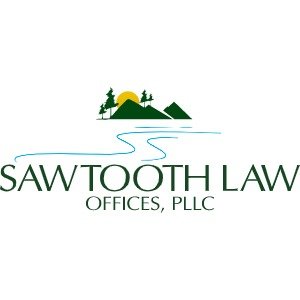Best Trusts Lawyers in Idaho
Share your needs with us, get contacted by law firms.
Free. Takes 2 min.
Or refine your search by selecting a city:
List of the best lawyers in Idaho, United States
About Trusts Law in Idaho, United States
Trusts are a key part of estate planning in Idaho and allow individuals (known as grantors or settlors) to transfer assets to a trustee, who manages them for the benefit of one or more beneficiaries. Trusts can be created during a person’s lifetime (living trusts) or upon their death through their will (testamentary trusts). Idaho law governs the creation, management, and administration of trusts to ensure that they are used properly and in the best interest of all parties involved. Trusts in Idaho can serve different purposes, such as managing assets for minors, protecting property from creditors, avoiding probate, and ensuring privacy in estate distribution.
Why You May Need a Lawyer
Many people seek legal help regarding trusts for a variety of reasons. Common situations include:
- Establishing a revocable or irrevocable trust as part of an estate plan
- Managing or updating an existing trust to reflect life changes like divorce, remarriage, or the birth of children or grandchildren
- Resolving disputes between trustees and beneficiaries
- Understanding tax implications related to trusts in Idaho
- Navigating complex rules around special needs trusts
- Addressing concerns about trustee misconduct or breach of fiduciary duty
- Exploring asset protection options or business succession planning
While some trusts can be set up with basic forms, an Idaho trusts lawyer can provide tailored advice and draft documents to avoid costly mistakes or future legal challenges.
Local Laws Overview
Trusts in Idaho are primarily governed by the Idaho Uniform Trust Code, which is found in Title 15, Chapter 7 of the Idaho Statutes. Here are key features of Idaho law:
- Validity: Idaho recognizes both revocable and irrevocable trusts, as well as living and testamentary trusts. Trusts must meet certain requirements to be legally binding, such as having a clear purpose, a valid trustee, identifiable beneficiaries, and written documentation.
- Trustee Duties: Trustees in Idaho have a legal duty to act in the best interests of beneficiaries, manage assets prudently, and provide accountings as required by the trust document or state law.
- Modification and Termination: Trusts can generally be modified or terminated with the consent of the grantor and all beneficiaries, or by court order in certain cases.
- Creditor Protection: Some trusts, known as spendthrift trusts, offer protection against the creditors of beneficiaries. However, Idaho law sets out specific limits and exceptions.
- Tax Considerations: Idaho does not have a state-level estate or inheritance tax, but federal tax rules may still apply to trust assets and distributions.
- Special Provisions: Idaho law contains provisions for special types of trusts, such as charitable trusts or special needs trusts designed to protect public benefits eligibility.
Frequently Asked Questions
What is the difference between a revocable and irrevocable trust?
A revocable trust can be changed or revoked by the grantor at any time during their lifetime. An irrevocable trust generally cannot be changed or revoked once it is created, which can offer added creditor protection and tax advantages.
Do I need a trust if I already have a will?
Wills and trusts serve different purposes. A will directs how your assets are distributed after death, while a trust can manage assets during your lifetime and after your death, often avoiding probate and providing greater control and privacy.
Can I act as my own trustee?
Yes, in Idaho, you can serve as the trustee of your own revocable living trust. However, you should name a successor trustee to take over if you become unable to manage the trust.
How do I fund a trust?
Funding a trust involves transferring ownership of your assets, such as real estate, bank accounts, or investments, into the name of the trust. Proper funding is critical to ensure the trust works as intended.
Do trusts avoid probate in Idaho?
Yes, assets held in a properly funded trust generally avoid probate, which can speed up the distribution process and maintain privacy.
Are trusts subject to court supervision in Idaho?
Most trusts in Idaho operate outside of court supervision. However, beneficiaries or interested parties can bring a trust matter before the court if there are disputes or if the trust document requires oversight.
Can trusts help reduce taxes?
Trusts can be structured to help reduce estate and income taxes at the state or federal level, depending on your financial situation. While Idaho does not have an estate tax, federal laws may still apply.
What responsibilities does a trustee have?
Trustees must manage trust assets prudently, act in the best interests of the beneficiaries, keep accurate records, and follow the instructions in the trust document and Idaho law.
How are disputes about trusts resolved in Idaho?
Trust disputes are typically resolved through mediation or Idaho probate courts. Common disputes include disagreements about asset management, beneficiary rights, or trust interpretation.
How do I update or amend my trust?
If your trust is revocable, you can generally amend or restate it at any time with proper documentation. Irrevocable trusts are harder to change, though some modifications may be possible with beneficiary consent or by court order.
Additional Resources
The following organizations and resources can provide more information or assistance related to trusts in Idaho:
- Idaho State Bar - Provides lawyer referral services and educational materials about trusts and estates.
- Idaho Legal Aid Services - Offers resources for low-income individuals needing estate planning help.
- Idaho Court Assistance Office - Supplies forms and guidance for self-help estate matters.
- Idaho Office of the Attorney General - Can help if there is suspected abuse or fraud involving trusts or estate matters.
Next Steps
If you need legal assistance with a trust in Idaho, consider the following steps:
- Gather all relevant documents such as wills, existing trusts, financial statements, and information about your assets.
- List your goals for the trust, including beneficiary information, specific wishes, and any potential concerns.
- Contact a qualified Idaho estate planning attorney who specializes in trusts law for a consultation. They can identify potential issues, draft new documents, or help with trust administration.
- If cost is a concern, explore free or low-cost options through local legal aid societies or state bar association referral programs.
- Stay informed by reading reputable resources and, if needed, involving trusted family members or advisors in the planning process.
Taking a proactive approach and seeking help from a qualified legal professional can help you avoid costly mistakes and ensure your wishes are carried out according to Idaho law.
Lawzana helps you find the best lawyers and law firms in Idaho through a curated and pre-screened list of qualified legal professionals. Our platform offers rankings and detailed profiles of attorneys and law firms, allowing you to compare based on practice areas, including Trusts, experience, and client feedback.
Each profile includes a description of the firm's areas of practice, client reviews, team members and partners, year of establishment, spoken languages, office locations, contact information, social media presence, and any published articles or resources. Most firms on our platform speak English and are experienced in both local and international legal matters.
Get a quote from top-rated law firms in Idaho, United States — quickly, securely, and without unnecessary hassle.
Disclaimer:
The information provided on this page is for general informational purposes only and does not constitute legal advice. While we strive to ensure the accuracy and relevance of the content, legal information may change over time, and interpretations of the law can vary. You should always consult with a qualified legal professional for advice specific to your situation.
We disclaim all liability for actions taken or not taken based on the content of this page. If you believe any information is incorrect or outdated, please contact us, and we will review and update it where appropriate.
Browse trusts law firms by city in Idaho
Refine your search by selecting a city.












